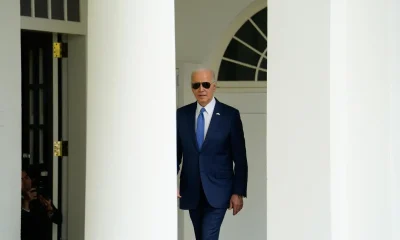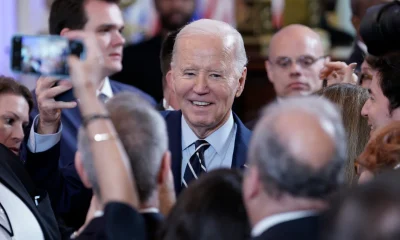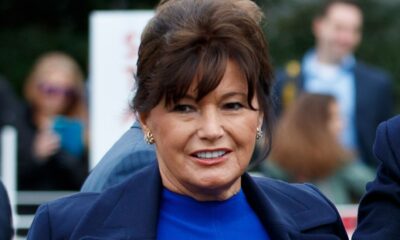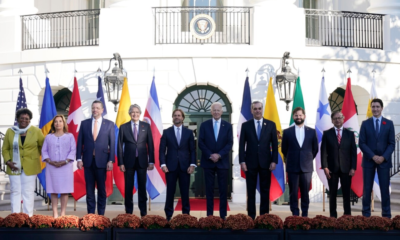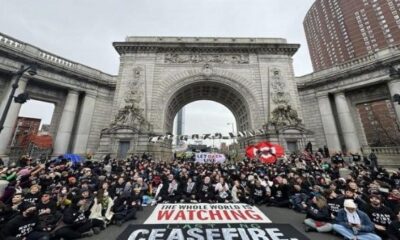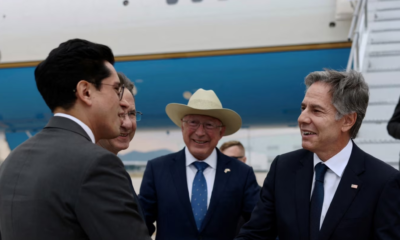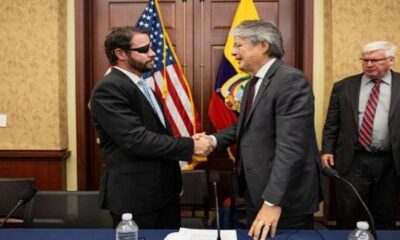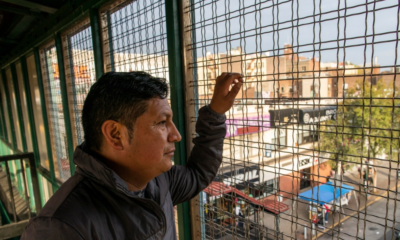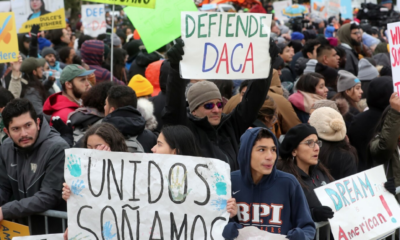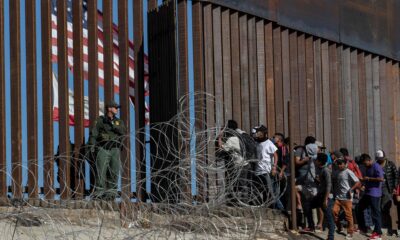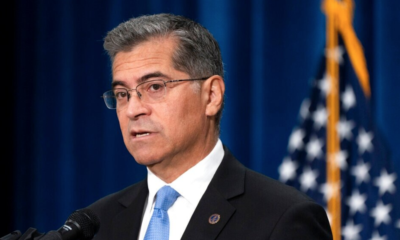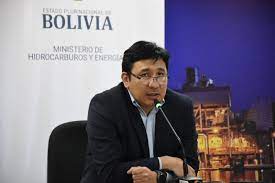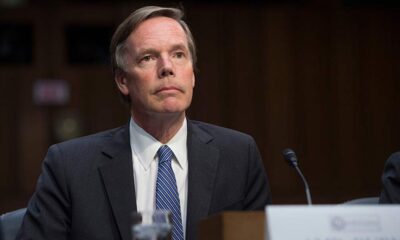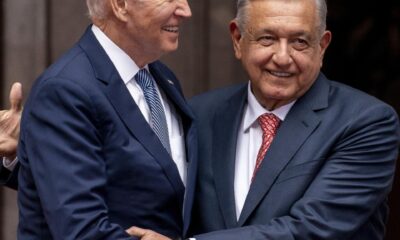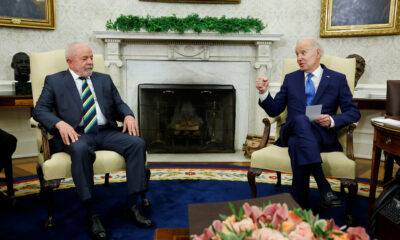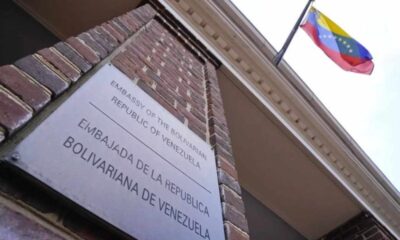International
As midterm count drags on, focus shifts to 2024 White House race
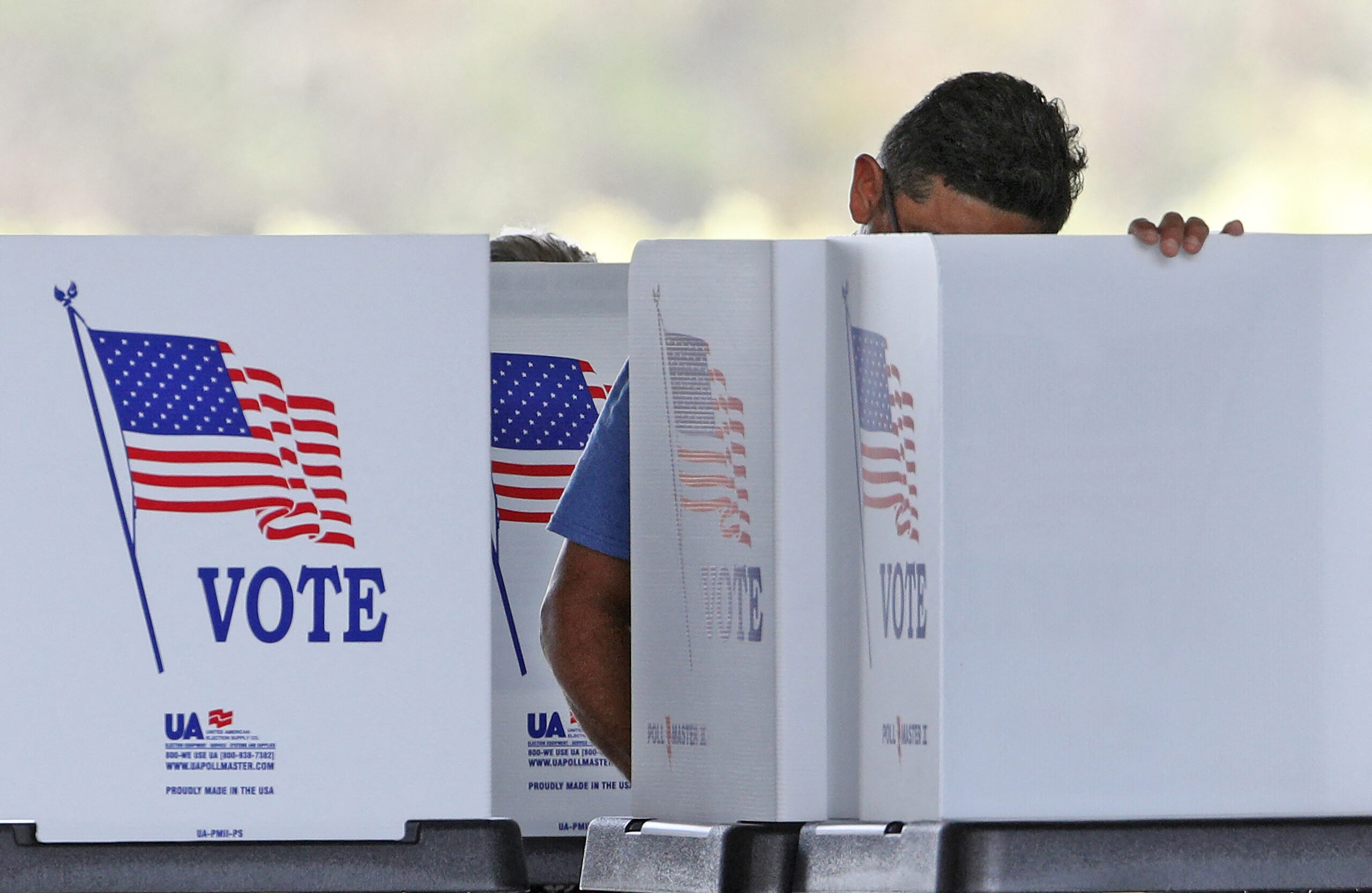
| By AFP | Chris Lefkow |
Control of the US Congress hung in the balance on Thursday as ballot-counting dragged on and attention shifted to the next big election — the 2024 presidential race — and whether Americans could see a Joe Biden-Donald Trump re-match.
With 209 seats so far, Republicans appear poised to secure a slim majority in the 435-seat House of Representatives, but control of the Senate may come down to an early December runoff in the southern state of Georgia.
Biden celebrated on Thursday what he said was the success of his Democratic Party in fending off a predicted Republican landslide in a stormy economic climate.
“For months and months, all of you heard from the press and the pundits was Democrats are facing to disaster … a giant red wave,” he said. “Folks, that didn’t happen.”
“The American public have made it clear — they expect Republicans to work with me,” he said.
Speaking a day earlier, Biden who turns 80 this month and is already America’s oldest president, insisted he intends to run for a second term in 2024 despite calls by some members of the party for him to hand the reins over to a new generation of leaders.
He promised a final decision “early next year.”
A drubbing would have surely raised questions about whether Biden should run again. But instead he did better than his two Democratic predecessors, Barack Obama and Bill Clinton, who both took a hammering in their first midterms.
The 76-year-old Trump has promised a “very big announcement” in Florida on Tuesday that is expected to be the launch of his campaign for the 2024 Republican presidential nomination.
Trump’s early entry into the race would appear designed in part to fend off possible criminal charges over taking top secret documents from the White House, his efforts to overturn the 2020 election and the attack on the US Capitol by his supporters on January 6 last year.
It may also be intended to undercut his chief potential rival for the Republican presidential nomination, Florida Governor Ron DeSantis, who emerged as one of the biggest winners from Tuesday’s midterms.
“(Trump’s) intention is to consolidate his support early and crowd out other potential candidates,” said Jon Rogowski, a professor of political science at the University of Chicago.
‘Ron De-Sanctimonious’
The 44-year-old DeSantis, a Harvard- and Yale-educated lawyer, notched up a nearly 20-point victory over his Democratic opponent in the Florida governor’s race and took credit for a host of Republican victories in other races in the Sunshine State.
“We not only won election, we have rewritten the political map,” DeSantis said. “We’ve got so much more to do and I have only begun to fight.”
While DeSantis has emerged as Trump’s main rival for the nomination, the former president continues to dominate in the polls when Republicans are asked who they want to represent the party in the 2024 White House race.
But Trump may have lost the backing of a major ally — the powerful media empire of conservative billionaire Rupert Murdoch.
Pointing to the party’s disappointing midterms showing, The Wall Street Journal, the flagship of Murdoch’s News Corp, declared in an editorial on Thursday that “Trump Is the Republican Party’s Biggest Loser.”
The cover of the tabloid New York Post depicted Trump on a precarious wall as “Trumpty Dumpty” who “had a great fall” in the vote, blaming him for the failure of Republicans to sweep past Democratic rivals.
It celebrated DeSantis as “DeFUTURE.”
Trump coined his own derogatory nickname for DeSantis, a one-time ally, referring to him as “Ron De-Sanctimonious” and belittling his election victory.
“Shouldn’t it be said that in 2020, I got 1.1 Million more votes in Florida than Ron D got this year, 5.7 Million to 4.6 Million?” Trump said on his Truth Social platform. “Just asking?”
Biden was asked by reporters on Wednesday about a Trump-DeSantis showdown.
“It’ll be fun watching them take on each other,” he said.
In the Senate, Democrat John Fetterman defeated Trump-endorsed candidate Mehmet Oz, seizing the Pennsylvania seat after the most expensive Senate race in US history.
The final makeup of the Senate now hangs on three seats: Arizona and Nevada, where the counting of votes could take several more days, and Georgia, where there will be a December 6 runoff between Democratic incumbent Raphael Warnock and former American football star Herschel Walker.
Even with a slim majority in the House, Republicans could stymie Biden’s legislative agenda and launch investigations into the president and his allies.
International
Claudia Sheinbaum: Operation Against ‘El Mencho’ Was Based on Pending Arrest Warrants

Mexico’s President Claudia Sheinbaum on Wednesday rejected claims that the military operation that resulted in the death of Nemesio Oseguera Cervantes, known as “El Mencho,” leader of the Jalisco New Generation Cartel (CJNG), was carried out under pressure from the United States government.
Sheinbaum explained that the deployment of federal forces was aimed at executing outstanding arrest warrants against Oseguera Cervantes, who was considered one of the most wanted criminals in both Mexico and the United States.
“That was not the objective (to ease pressure from the United States). It is very important, and I want to repeat it. This individual had an arrest warrant, or several,” Sheinbaum said, referring to the operation conducted on February 22.
According to the president, the initial goal was to capture Oseguera Cervantes, but military forces responded after coming under attack during the intervention.
“The operation was to detain him. The problem is that they were attacked — the Secretariat of National Defense — and they responded at that moment,” she said.
The president insisted that the action was not carried out in response to external demands, although she acknowledged intelligence cooperation with the United States.
“It was not done in any way because of pressure from the United States, not at all. Of course, there was intelligence information from the United States that was used specifically,” she concluded.
International
Spain Denies Any Agreement to Cooperate with U.S. Military in Iran Operations
International
White House Says Spain Agrees to Cooperate with U.S. Military After Trump Threatens Trade Embargo

White House Press Secretary Karoline Leavitt said Wednesday that Spain has agreed “in recent hours” to cooperate with the U.S. military, following President Donald Trump’s threat to impose a trade embargo on Madrid.
Trump had warned of potential commercial measures after Spain reportedly refused to allow the Pentagon to use facilities at Spanish military bases for operations related to Iran.
“With respect to Spain, I think you heard the president’s message yesterday loud and clear, and I understand that in recent hours they have agreed to cooperate with the United States military,” Leavitt said during a press briefing.
She added that the U.S. military is currently coordinating with its counterparts in Spain. However, the president expects broader support.
“The president expects that all of Europe, all of our European allies, of course, will cooperate in this important mission — not only for the United States, but also for Europe,” Leavitt said.
Her remarks came in response to questions about Spain’s position and its role as a U.S. ally amid rising tensions surrounding operations involving Iran.
-

 International4 days ago
International4 days agoIran Reports 201 Dead, 747 Injured After U.S. and Israeli Strikes
-

 International3 days ago
International3 days agoBrazil’s Supreme Court Rejects Bolsonaro’s Bid for House Arrest
-

 International3 days ago
International3 days agoAnti-ICE Billboard Campaign Targets Immigration Spending in 31 U.S. Cities
-

 International2 days ago
International2 days agoSpain’s Prime Minister to Address Nation Amid Trump’s Trade Threats
-

 International4 days ago
International4 days agoPope Leo XIV Urges End to ‘Spiral of Violence’ in Middle East
-

 Sin categoría5 days ago
Sin categoría5 days agoTrump: ‘We Think It’s True’ Amid Claims Iran’s Supreme Leader Was Killed
-

 International5 days ago
International5 days agoSecurity Council to Hold Emergency Meeting on Middle East Crisis
-

 International3 days ago
International3 days agoTrump Warns of ‘Major Wave’ of Attacks as Iran Conflict Escalates
-

 International22 hours ago
International22 hours agoWhite House Says Spain Agrees to Cooperate with U.S. Military After Trump Threatens Trade Embargo
-

 International3 days ago
International3 days agoMexico Calls for Immediate Probe After National Dies in ICE Custody
-

 International2 days ago
International2 days agoNew York Announces First 2,000 Seats in Universal 2-K Program
-

 International22 hours ago
International22 hours agoSpain Denies Any Agreement to Cooperate with U.S. Military in Iran Operations
-

 Central America22 hours ago
Central America22 hours agoNicaragua Held Responsible for Harassment of Opposition Prosecutor and His Family
-

 International3 days ago
International3 days agoBolivia Orders Three Investigations Into Deadly Military Plane Crash
-

 International2 days ago
International2 days agoWarner Bros. Developing First ‘Game of Thrones’ Movie With ‘Andor’ Writer
-

 Central America3 days ago
Central America3 days agoPanama Canal Monitoring Trade as Middle East Conflict Disrupts Shipping
-

 Central America2 days ago
Central America2 days agoGuatemala’s Attorney General Fails in Bid for Top Court Seat Amid Corruption Allegations
-

 International22 hours ago
International22 hours agoClaudia Sheinbaum: Operation Against ‘El Mencho’ Was Based on Pending Arrest Warrants































